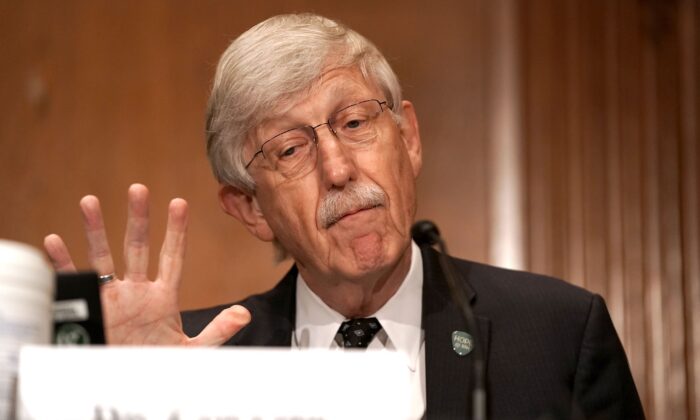U.S. National Institutes of Health Director Dr. Francis Collins said he believes COVID-19 vaccine booster use will be expanded despite a panel of Food and Drug Administration (FDA) experts recommending against them for the general population.
An overwhelming majority of the panel voted against recommending Pfizer’s COVID-19 booster for most of the general population, although later approved them for individuals aged 65 and older. Some scientists on the panel expressed concern that side effects associated with the vaccine such as myocarditis, a type of heart inflammation, aren’t properly understood and suggested that young people don’t need boosters for now.
But in an interview on Sept. 19, Collins, whose agency doesn’t oversee the FDA, said that the booster doses will likely be approved in the future.
“I think the big news is that they actually did approve the initiation of boosters, and remember they’re taking a snapshot of right now. We’re going to see what happens in the coming weeks,” Collins told “Fox News Sunday.”
“It would surprise me if it does not become clear over the next few weeks, that administration of boosters may need to be enlarged.”
For the claim, Collins referenced studies and data published in Israel and the United States, which Pfizer also cited to make its arguments in favor of booster doses to the FDA.
“Based upon the data that we’ve already seen both in the U.S. and in Israel, it’s clear that waning of the effectiveness of those vaccines is a reality, and we need to respond to it,” Collins said, adding that he would be “surprised” if the boosters are not recommended for individuals younger than 65. However, he told the broadcaster that he isn’t sure if “absolutely everyone” will be recommended to get boosters.
“I’m a little troubled that people are complaining that the process isn’t working for them,” he said. “The process is to look at the data have the experts consider it, and then make their best judgment at that point, recognizing that the judgments may change.”
On Sept. 17, the FDA’s vaccine advisory panel voted 16–3 against providing booster doses of Pfizer’s vaccine after an hours-long discussion in which many scientists struck a skeptical tone. However, they voted 18–0 to recommend boosters, or third doses, to the 65-and-older age group.
“We are not bound at FDA by your vote, just so you understand that. We can tweak this as need be,” Dr. Peter Marks, the agency’s top vaccine official, said after the votes were cast.
Before that, Dr. James Hildreth, a voting member on the FDA expert panel, said he has “a serious concern of myocarditis in young people.” The FDA previously issued warnings that, while rare, Pfizer and Moderna vaccines, both of which are built on mRNA technology, could cause myocarditis or pericarditis among younger recipients.
“I honestly don’t think there is enough good quality data at this point to make an informed decision,” Brittany Kmush, an epidemiologist at Syracuse University, said of the Israeli study, noting the 12-day follow-up period and the variability of the authors’ estimates.
Another FDA advisor, Dr. Melinda Wharton, meanwhile, echoed Hildreth’s concerns and said she would “not feel comfortable” with recommending boosters to younger people due to the risk of myocarditis. Younger people aren’t at risk of developing severe illness from COVID-19 or becoming severe breakthrough cases, she noted.

